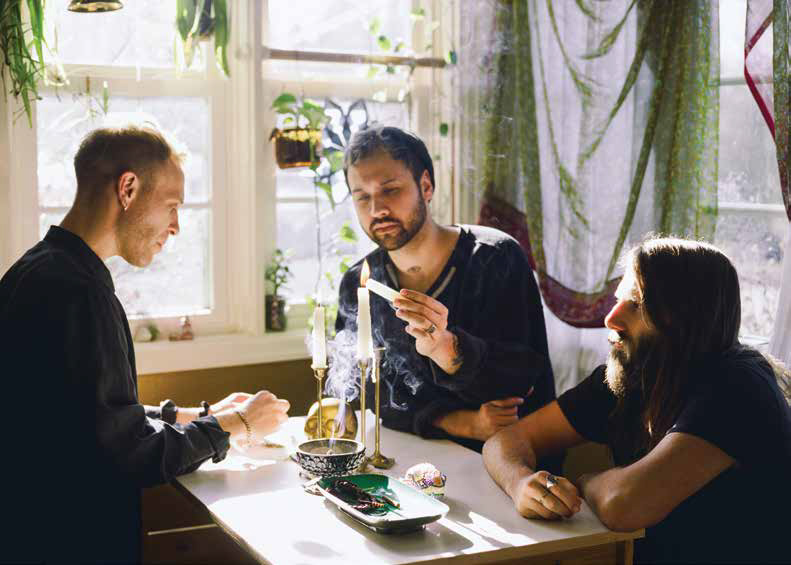Summer Stars: Unknown Mortal Orchestra

For a guy who once seemed to relish his anonymity, Ruban Nielson comes across as much more personable and outspoken than his music might have implied previously. Only five years ago, he leaked his first single under the name Unknown Mortal Orchestra; the spooky-sounding “Ffunny Ffrends” sealed his arrival as an indie outsider with a lo-fi, psychedelic ear for languid guitar chops, crushed hip-hop beats and haunting falsettos. He followed up with two albums that gradually carved out a hazy, sometimes soul-damaged terrain, especially on songs like “So Good at Being in Trouble” and “Swim and Sleep (Like a Shark),” from 2013’s II.
Oddly enough, Nielson had conceived of II as a hangover cure for the pressures of instant fame and the party-soaked binge of constant touring. “I didn’t go into it thinking, ‘Oh, this is gonna be a sad record,’” he says. “But at the end of it, all of a sudden, I thought: ‘Wow, I guess I’m really depressed.’ And I was a bit worried about that.” Almost as soon as he hit the road again with his band—bassist Jake Portrait and drummer Riley Geare—Nielson started hearing passionate tales from fans about how the album’s dark embrace had helped them cope with a tragic loss. “I get it—sometimes you feel like you want to drop out of the rat race and hide somewhere. You can get your energy back that way, but music can also propel you to get out of bed and get back in the ring. So I guess the first thing that I thought, when I was considering what to do next, was I wanted to make a happy record.”
Multi-Love (Jagjaguwar) is most certainly that. Tracked almost entirely at Nielson’s home studio in Portland, Ore. (where he relocated from his native New Zealand in 2007), the album breathes with a surefooted optimism that recalls Songs in the Key of Life-era Stevie Wonder or early ‘80s Prince, filtered and squeezed into the casing of a well-worn mixtape. From the love-crazed mutant disco of the title track to the infectiously bouncy melody of “Ur Life One Night” or the loping James Brown groove of “The World Is Crowded,” the celebratory mood seeps through at every turn.
What’s more, as the recording sessions turned into a bit of a family affair—brother Kody plays drums on most of the songs, and father Chris lends a jazzy horn hook to the funky space-pop workout “Necessary Evil”—Nielson also found time to indulge his fascination with vintage synthesizers. An accomplished multi-instrumentalist and gearhead, he started tracking down broken synths from the early ‘70s that would have cost him a small fortune to buy in any playable condition. Then he set to work fixing them up.
“Some of them didn’t work out, and some did,” he reveals. “With synthesizers, I was always more interested in the ‘70s sound, like what Bowie and Eno were doing, and all the krautrock stuff. They were making it up as they went along, and it was all analog, before digital made the possibilities endless. It was a more simple technology, so I started looking for these older synths, and I found myself able to get some sounds that I thought I’d never have access to.”
Of course, beyond the joy of experimentation that makes Multi-Love such an uplifting sonic experience, there’s an underlying message that drove Nielson from the moment he started work on the album. Sparked by a tour stop in Shanghai in early 2014, and then the events in Ferguson, Mo., he looked to the past for inspiration—in particular, Sly and the Family Stone’s milestone album Stand!—and found that nothing much had changed.
“Obviously we live in the present, but sometimes I feel like we live in the future,” he explains. “Shanghai made me think of that because it’s so built up, you can’t even be nostalgic about it. Then when Ferguson happened, it was this wake-up call that things aren’t really that different. I grew up thinking that the ideals of the ‘60s, the things that the Beatles might talk about, were the foundation of the modern era. But they were crushed at some point, and part of the defeat was convincing everybody that we were still building on them. So I listen to Stand! and it’s like, this is talking about now. That really affected me.”
He sounds fired up, and with good reason. As Nielson and his UMO comrades steel themselves for yet another globe-trotting tour, the new material is already adapting and growing. “We’ve started messing with the arrangements and expanding on the ideas that are on the record,” he says excitedly. “Stuff like that is really the fun part, you know? I can’t wait to get out there. It’s gonna be cool.”



















